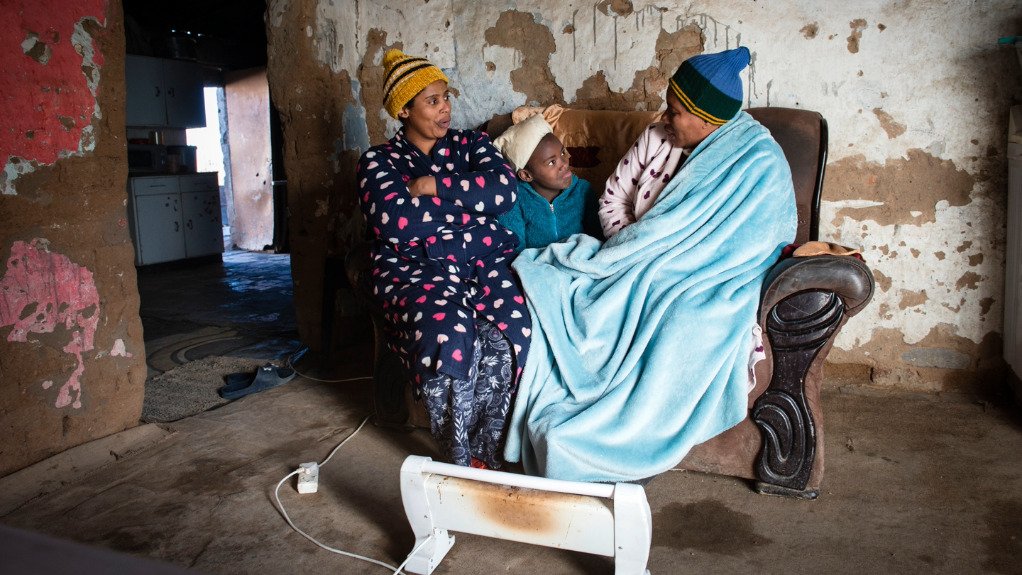South Africa urged to firm up developmental vision for universal electricity access


Family members at their home in De Aar trying to keep warm in winter
Photo by Bram Lammers
A leading advocate for the provision of free basic electricity (FBE) to poor South African households has welcomed moves by government to pursue its universal access goal through a “developmental” lens but believes more still needs to be done to firm up what affordable access means and the best ways of achieving that objective.
In his Budget Vote speech, Dr Kgosientsho Ramokgopa announced that government’s revised universal access strategy would reframe electrification as a developmental and rights-based obligation rather than a legacy infrastructure backlog.
He also announced that a blended finance approach would be adopted to mobilise the funding needed to connect the 1.6-million households in South Africa by 2030 that still do not have access to electricity. In addition, delivery would be broadened to include alternative technologies, including micro- and off-grid solutions, especially in rural areas, but also potentially in informal settlements and peri-urban areas.
Public Affairs Research Institute (PARI) just transition programme head Dr Tracy Ledger, a vocal champion of the cause of affordable electricity access who has authored several research papers on the topic, believes the profile being given to both universal access and affordability by Ramokgopa is laudable.
In light of South Africa’s fiscal constraints, Ledger also agrees that it is important to pursue innovative financing models to address the electrification backlog, as well as the chronic infrastructure constraints in urban townships. This, so as to cater for the consumption growth that accompanies densification and the rise of economic activity in areas initially developed as dormitory towns, without resorting to so-called load reduction, which results in areas being cut during peak periods.
She is more cautious, however, about broadening the supply options to include ‘micro-grid’ solutions outside of remote rural areas, arguing that universal access should be premised on the provision of a grid-type service, and not one that relegates such access to only lighting and the charging of a few appliances.
Only if these off-grid and micro-grid alternatives are able to supply consistent electricity for more power-intensive functions such as cooking and activities that support livelihoods, should they, in Ledger’s view, be included as a universal service roll-out option.
REDEFINING ACCESS & AFFORDABILITY
Ledger is most critical, however, of government’s definition of both access and affordability, arguing that these definitions need to be made more “concrete” if they are to meet the developmental objectives that have been outlined by the Minister.
“To deliver a developmental mandate in the area of electricity, the focus of universal access must be on ensuring that everybody can actually access a developmental level of electricity, which we calculate to be between 250 kWh and 350 kWh a month,” she tells Engineering News.
South Africa’s current monthly FBE threshold is 50 kWh, which Ledger says falls well short of the developmental goals of raising living standards and hoping to catalyse micro economic activity.
In a recently released PARI research paper titled ‘Affordability of Basic Services for South African Households’, written by Ledger and Nonhlanhla Mathibela, the prevailing free basic services of 50 kWh of electricity a month and 25 litres of water a day is described as mere “survival access” rather than developmental in nature.
In addition, to secure these services, poor South Africans must currently register to be included on a municipality’s indigent register; a process that in most cases is so onerous that the majority of eligible households find themselves excluded from the benefit.
“In 2022, municipalities reported a total of 2.8-million registered indigent households, against national funding for 10.9-million households.
“Only 1.7-million households were reported to have received the FBE benefit in that year,” the paper highlights.
There is also currently no national standard to define an indigent household, which means that two households with exactly the same profile, but located in different municipalities, will have vastly different access to the free services.
NEW MODEL
Ledger is, thus, arguing for a national policy that removes municipal discretion, as well as an overhaul of the current funding model for the free services.
In light of South Africa’s fiscal constraints, PARI recommends increasing the FBE to 150 kWh and raising the monthly free basic water allocation from 6 kl to 8 kl, alongside free basic sanitation and waste removal services.
It then proposes limiting these free services to the estimated 7.5-million households that live below a monthly minimum wage household income level of R4 744. These are the households most likely to be sacrificing basic food expenditure to pay for electricity.
A cost comparison of this proposed model against the National Treasury’s current R81.8-billion allocation that theoretically caters for 11.2-million households, but which are mostly not receiving the free services, shows that there could be a dramatic rise in benefits for a modest increase in funding to R88.29-billion.
“This R6.5-billion increase in allocations would result in substantial benefits for the poorest households, giving them a level of free services that can support higher standards of living and facilitate a wide range of livelihood opportunities,” Ledger says.
While the FBE will still fall short of the 250 kWh to 350 kWh that PARI regards as developmental, Ledger argues that it will reduce the gap substantially and allow policymakers to set targets for progressively raising the FBE to a developmental level.
At these higher levels of free services, municipalities and Eskom will also have greater moral legitimacy to clamp down on illegal connections, which are currently pursued by poor households partly because the free service is either inaccessible or too small to be meaningful.
Simultaneously, a national standard could be rolled out for identifying indigent households and for maintaining indigent registers. The aim would be to remove the function from municipalities that currently have no incentive to identify such households, as they are using the resources disbursed by national government for free services to pay for other functions.
Ledger argues that government could also explore the creation of a national agency to manage the register, or even incorporate the function into the role of the South African Social Security Agency, which will not suffer from the same moral hazard as the municipalities.
“Ultimately, we need more concrete policy goals in relation to the quantum of access, and clear affordability standards, measured in monetary terms.
“Every single household in South Africa should be able to access a minimum amount of electricity relative to their income and their food requirements, and that means that a significant portion of services have to be for free,” Ledger concludes.
Article Enquiry
Email Article
Save Article
Feedback
To advertise email advertising@creamermedia.co.za or click here
Press Office
Announcements
What's On
Subscribe to improve your user experience...
Option 1 (equivalent of R125 a month):
Receive a weekly copy of Creamer Media's Engineering News & Mining Weekly magazine
(print copy for those in South Africa and e-magazine for those outside of South Africa)
Receive daily email newsletters
Access to full search results
Access archive of magazine back copies
Access to Projects in Progress
Access to ONE Research Report of your choice in PDF format
Option 2 (equivalent of R375 a month):
All benefits from Option 1
PLUS
Access to Creamer Media's Research Channel Africa for ALL Research Reports, in PDF format, on various industrial and mining sectors
including Electricity; Water; Energy Transition; Hydrogen; Roads, Rail and Ports; Coal; Gold; Platinum; Battery Metals; etc.
Already a subscriber?
Forgotten your password?
Receive weekly copy of Creamer Media's Engineering News & Mining Weekly magazine (print copy for those in South Africa and e-magazine for those outside of South Africa)
➕
Recieve daily email newsletters
➕
Access to full search results
➕
Access archive of magazine back copies
➕
Access to Projects in Progress
➕
Access to ONE Research Report of your choice in PDF format
RESEARCH CHANNEL AFRICA
R4500 (equivalent of R375 a month)
SUBSCRIBEAll benefits from Option 1
➕
Access to Creamer Media's Research Channel Africa for ALL Research Reports on various industrial and mining sectors, in PDF format, including on:
Electricity
➕
Water
➕
Energy Transition
➕
Hydrogen
➕
Roads, Rail and Ports
➕
Coal
➕
Gold
➕
Platinum
➕
Battery Metals
➕
etc.
Receive all benefits from Option 1 or Option 2 delivered to numerous people at your company
➕
Multiple User names and Passwords for simultaneous log-ins
➕
Intranet integration access to all in your organisation


















